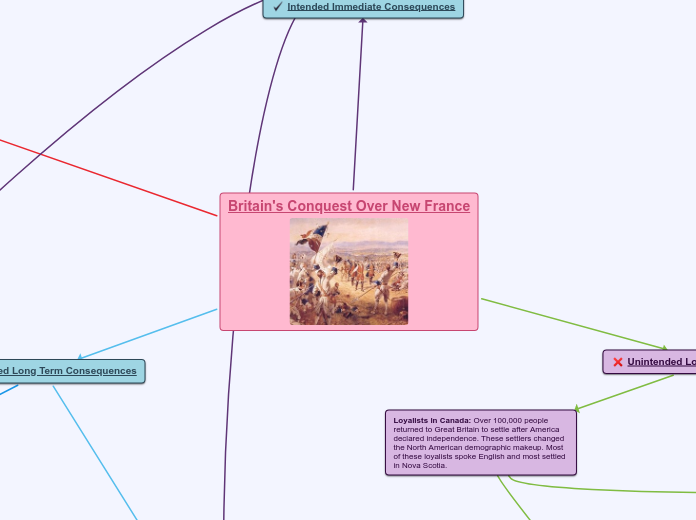Britain's Conquest Over New France
Intended Immediate Consequences
Intended Long Term Consequences
The Quebec Act: Came into effect in 1775. It's main impact was moving the borders of Quebec to include Labrador, Ile d'Anticosti, Iles de la Madeleine, and Aboriginal territory south of the Great Lakes. The act also reimposed British criminal law, French civil law and promised religious freedom to Roman Catholics.
Haldimand Proclamation:Frederick Haldimand (Governor of Quebec) and the Haudenosaunee reached a settlement in 1784 that gave the Haudenosaunee the Haldimand Tract to compensate them for allying with Britain during the American Revolution. The Canadian Government and the Six Nations Confederacy are still negotiating about the title to the land.
Indian Act: In 1876, this act that allowed the Canadian Government to control many aspects of the Indigenous life, was put into effect. (ex. land, resources, education, status)
The Canadian National Railway Settlement: A settlement of $610,000 in the form of land was reached in 1987 after the Six Nations Council filed a claim in 1980, because a railway was using a reserve's land without authorization. Three parcels of land were added to the reserve as per the agreement.
Unintended Immediate Consequences
Psychological Impact: The Quebec Act had a psychological impact on some because the war had been so harsh that they were scared of the consequences that may come of the act.
The American Revolution: The American Revolution broke out in 1775 because the British Crown and many North American Colonies were not getting along. What is now the United States of America, was formed when the independence of 13 of Britain's North American colonies was gained.
The Oka Crisis: 11 July–26 September 1990 standoff between police, army and Mohawk protesters caused by a proposal of a golf course and condominiums that would be built on Mohawk burial ground, as well as land that was being disputed. The protest was ended by the army, the land was bought by the Federal Government and all construction was cancelled.
Unintended Long Term Consequences
Loyalists in Canada: Over 100,000 people returned to Great Britain to settle after America declared independence. These settlers changed the North American demographic makeup. Most of these loyalists spoke English and most settled in Nova Scotia.
Constitutional Act: Came into effect in 1791, separating Quebec into Upper and Lower Canada. Upper Canada acquired English common law due to the fact that most loyalists had settled there. Lower Canada continued to keep French property rights and all rights from the Quebec Act. Upper Canada became Ontario and Lower Canada became Quebec in 1867.
Multicultural Canada: Because of the variety of loyalists that came to Canada after the American Revolution, there was now French, British, Indigenous and more. This lead to the multicultural Canada we have today, with a wide variety of inhabitants.
French Canadian Nationalists: After the conquest French Canadians felt like they had to defend themselves and protect their culture, so even through the concept of nationalists wasn't around yet, this is what some individuals started to do soon after.
